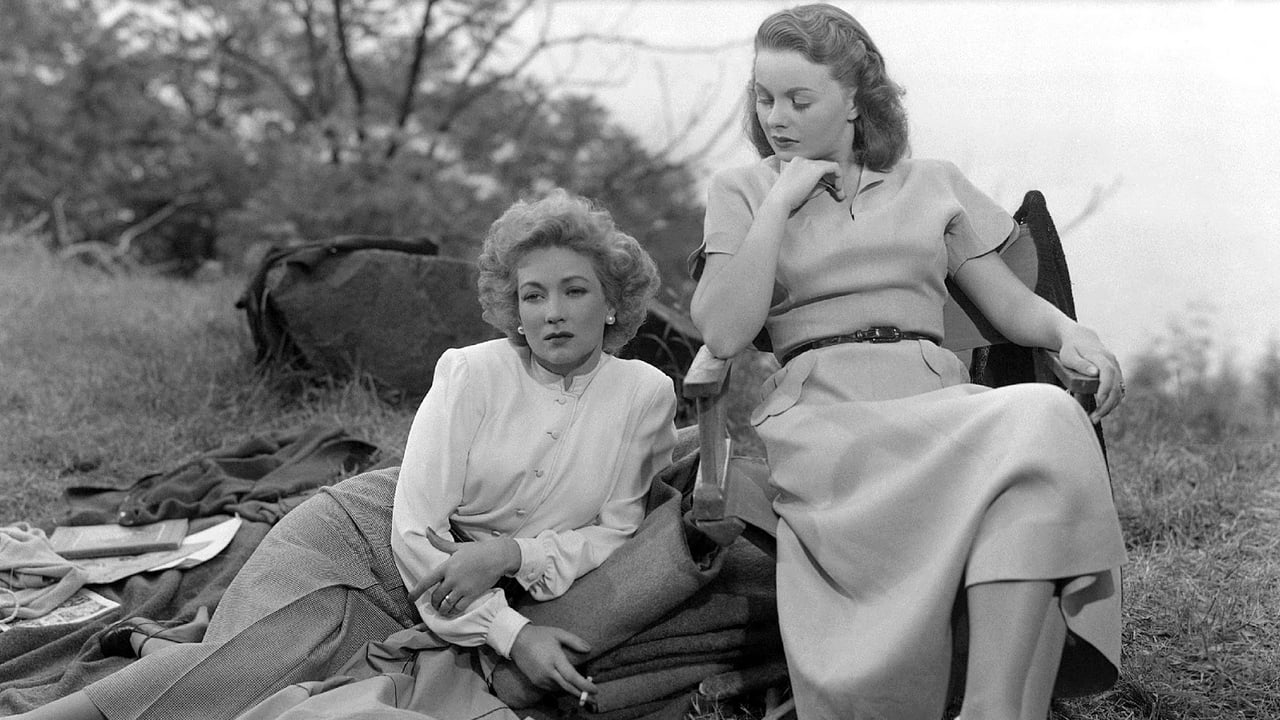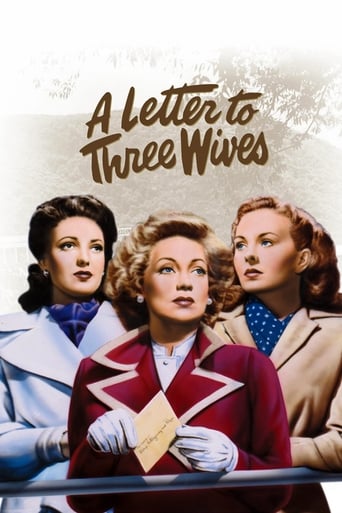



Wow! Such a good movie.
What makes it different from others?
everything you have heard about this movie is true.
View MoreA Disappointing Continuation
With a "friend" like Addie Ross who needs enemies? Deborah, Rita and Lora Mae are the three wives of the film's title. And Addie Ross is going to deliver them that devastating letter. The trio of young wives are good friends, Addie very much the outsider whom they keep a wary eye on. And wary they should be because each of their husbands is quite clearly smitten with Addie. The men look upon Addie as a goddess. The women look upon her with disdain. Addie knows how they feel about her. And boy will she ever get her revenge. The trio of wives are about to embark on a daylong cruise, chaperoning a group of underprivileged children. And just before the boat sets off Addie has that letter delivered to them. She tells them she is leaving town for good...and she has taken one of their husbands with her. And Addie really twists the knife by not saying which husband it is she has run off with. So now our three wives face a long day of torment, each wondering if she will be the one to return home to find her husband gone. That Addie Ross, what a stinker.As the cruise goes on we, through a series of flashbacks, see how each wife's marriage is somewhat strained, why each husband may be tempted to run away. First up is Deborah, a simple farm girl who met her husband-to-be Brad in the Navy. Deborah is desperately uncomfortable in Brad's upper class social circle. And also very uncomfortable with the fact that everyone in that circle always assumed Brad was going to marry Addie. Next comes the telling of Rita's story. She's a successful career woman, writing scripts for popular radio programs. Her husband George, a humble teacher, is a little insecure about the fact his wife is more successful than he is. It all comes to a head at an exceedingly awkward dinner Rita hosts for her boss. That the dinner happens to be on George's birthday, a fact Rita forgot until a present arrives from Addie, doesn't help matters. Finally we come to Lora Mae. She's married to Porter, perhaps the richest man in town. Did he ever want her for anything more than her beauty? Did she ever want him for anything more than his money? Is there any love here at all? And why, the first time Porter brings Lora Mae to his home, did he have a picture of Addie on top of his piano? So the women all wonder who's lost her husband and we wonder right along with them. The story is very engaging, wonderfully scripted with plenty of good wit sprinkled throughout. Addie narrates the story but director Joseph L. Mankiewicz uses a smart device to keep her largely shrouded in mystery. The less we know about this supposed goddess the more intriguing things become. Addie sets the plot in motion but it is the three wives whom she torments who carry the film. And each of the three actresses plays her part wonderfully. Jeanne Crain plays the bundle of insecurities that is Deborah. This is clearly the most sympathetic character. You know if her husband leaves she'll fall to pieces and Crain really makes you feel for the poor woman. The other two women are much more assured. But Rita comes to realize maybe she was a little too assured for her own good. Has she emasculated, and ultimately lost, her husband? Ann Sothern plays this part and her interactions with Kirk Douglas, playing her husband, are top-notch. And then there is Linda Darnell, playing Lora Mae. Easy to see why Porter would want Lora Mae, Darnell's a stunner. But Darnell has more than her good looks going for her, she's a very strong actress too and she gives it as good as she gets with Paul Douglas, playing Porter. The rest of the film is very good but Lora Mae's story is a cut above, helped greatly by the powerful performances of Darnell and Paul Douglas. If Lora Mae was just in this marriage for money her husband running off would actually be a good thing. But maybe there's love there after all. Darnell captures that ambiguity perfectly.It's the women's picture, they're the unquestioned stars. But both Kirk Douglas and Paul Douglas have very important parts to play in the film's success as well. Jeffrey Lynn, playing Deborah's husband, has much less to do but what he does do he does capably. There's also a fun appearance from Thelma Ritter providing some comic relief in the role of a house servant. And of course, hovering over the whole picture, is the looming specter of Addie Ross. Mankiewicz uses her in just the right way to add another layer to the film's mystery. The film presents a smart, engrossing story. The three wives weave in and out of each other's stories, everything ties together beautifully. The relationships the wives have with their respective husbands are most important but the relationships they have with each other are very telling too. By the time that boat finally docks and the women race home to hopefully find their husbands you're right on the edge of your seat. Few romantic films are as dramatic as this. This is a very well thought-out, well-crafted, and ultimately very satisfying film.
View MoreNo need to recap the plot or echo consensus points. What interests me is the nature of the marital conflicts between the three couples, each shedding light on the larger American scene of the time and perhaps now, as well. Now, the casting of Kirk Douglas as the schoolteacher is interesting. In terms of appearance, he's much too dashing to fit the stereotypical male teacher of the movies. In a conventional sense, his could be taken as a typical Hollywood instance of miscasting glamor where it's not appropriate. However, considering his assertive remarks on teacher pay and on the artistic inferiority of commercial radio scripts, it looks like the writers wanted to boost the image of neighborhood teachers and make a point about education at the same time. Thus, the conflict between Douglas and wife Sothern stems from a typical concern of the time. Namely, that despite his education, she earns more than he. So when he attacks her sponsors, he's really assailing her lucrative writing job, because it's his standing as a male head of the house that has suffered.Second, note the humorous class difference between department store tycoon Paul Douglas and the floozy with designs, Linda Darnell. Douglas thinks it's going to be an easy conquest since he's rich and she's poor. But sex has a way of overcoming class differences, and she uses her biology expertly in manipulating him into marriage. The casting here is perfect since both actors are expert at hard cases, and it's this savvy element that brings them plausibly together, despite earth-shaking trains to nowhere.The third pair, Crain and Lynn, appear more separated by the social graces. She's unsure in a poignant way whether a simple backwater girl like herself can fit in with Lynn's more sophisticated city crowd. We don't see much of Lynn, but he seems a nice enough guy. Yet Crain's young wife remains painfully self-conscious, wondering whether she's good enough for him. Of course, we know she is since her genuine sweetness comes across, in spades. Besides, Sothern's sympathetic tutoring will eventually set everything right.The movie benefits greatly from centering the marital conflicts around issues that everyone can understand. The fact that the script does this so cleverly and humorously is a key reason the film continues to resonate.
View MoreWere all 40's women doormats, or is society today just a little more intolerant of prospective infidelity? It struck me that Paul Douglas' character is immediately forgiven for 'changing his mind' - and indeed, his admission seems to be heralded as the thing that SALVAGED their marriage. I'd wager that such a resolution would not be so eagerly swallowed by audiences of today - he'd at least be looking at several nights on the couch, just for considering it!I know that women back then were frequently exhorted not to rock the boat, but isn't it weird that she's not even a little put out, and indeed takes it as a positive sign for their future happiness together?! That seemed altogether too naive for me, not to mention inconsistent with the Lora Mae I'd come to know through previous scenes The other two women were weak-willed and meek, Lora Mae seemed as though she had more attitude and fire in her (or at least, she did until that ending!)Spending time with two paranoid and insecure women is not really my idea of fun, and unfortunately, even the sole independent lady is not permitted to retain her moxie *sigh*
View MoreAnd I thought this was a piece of fluff!!! the writing is smarter than in any movie I've seen all year. How predictive of our present undereducated public. The schoolteacher in the group is an educated man, not like many of the sad things in the classrooms today. And the script beautifully points out why: follow the money. we get what we pay for and our country is failing because of our failing schools, and our gullible masses, the result of an educational system that is 42nd in the world. Spoiler: I saw this as a teenager. And I remembered that one of the husbands HAD run away with Addie, but thought better of it and returned. Yet the line, "She'll know tomorrow morning" and Jeanne crain's kiss on the cheek to Paul Douglas for 'admitting' it, now makes me think that yes, her husband really did run away with this husband-stealer. The times have really changed: We wouldn't be dating our bosses in today's world. On the other hand, corporate wives and husbands still lick the behinds of anyone in the corporation who can give them a hand up the ladder. Our level of corruption is much higher. One mystery: the script has the mom lecturing Linda Darnell on not being a tramp, yet when the boss comes to pick her up, she tries to shoo her daughter out to the car. It's Darnell who insists that she gets picked up properly. Paradox or contradiction?Really want to know now how it actually ended. Was Paul telling the truth or we he just trying to soften the blow? Great writing. Boy, do I miss it. Kinda sad when I have to turn to foreign movies, old movies or the occasional indie to find any movies of substance that have BOTH excellent writing and acting. Just another symptom.
View More